World
Out in the World: LGBTQ news from Europe and Asia
JK Rowling mocked Scotland’s new hate crimes law

SCOTLAND
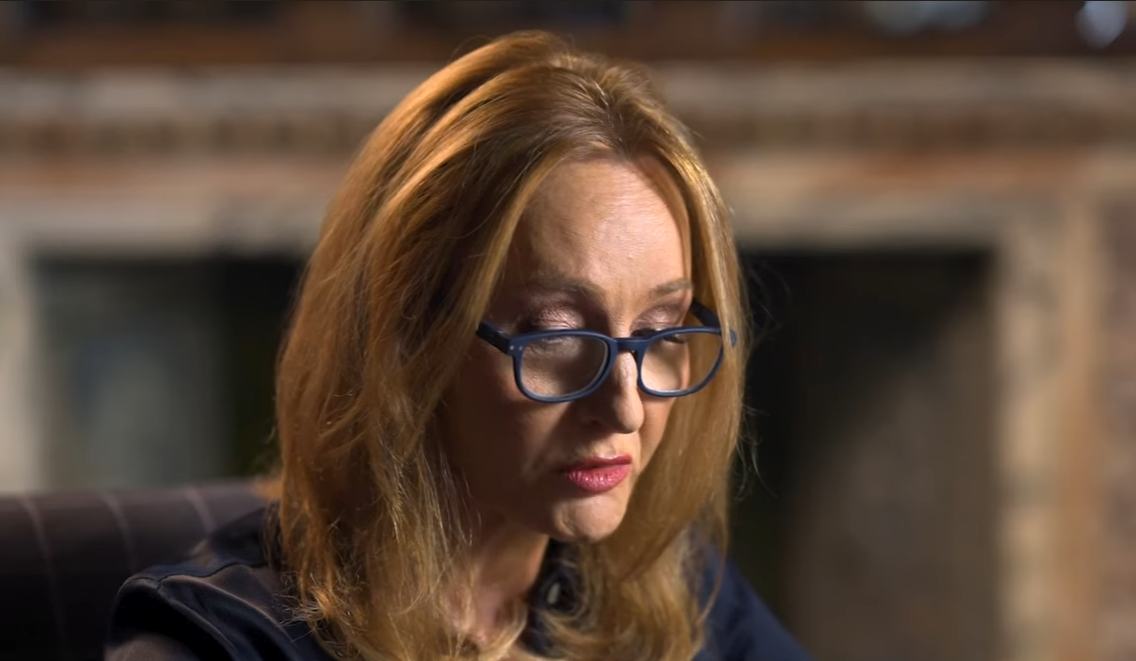
Harry Potter author JK Rowling took the opportunity of Scotland’s new hate speech law coming into force to harass several prominent British transgender people over X, but Scottish police say they’re not planning to charge her over her posts.
Rowling spent the morning of April 1 making a series of posts in mock celebration of the womanhood of well-known trans people, starting with some well-known convicted sex offenders and then listing several notable trans activists. At the end of her series of posts, Rowling gave up the joke.
“🎉🌼🌸April Fools! 🌸🌼🎉Only kidding. Obviously, the people mentioned in the above tweets aren’t women at all, but men, every last one of them,” she wrote. “If what I’ve written here qualifies as an offense under the terms of the new act, I look forward to being arrested when I return to the birthplace of the Scottish Enlightenment.”
As is her usual style, Rowling then spent the rest of the day reposting fawning congratulatory posts from other bigots and arguing with people who stood up to her.
Rowling was protesting the Hate Crime and Public Order (Scotland) Act 2021, which came into effect on April 1. The revision to Scottish hate crime law added protections for age, disability, religion, sexual orientation, gender identity and intersex people, both for aggravated punishment of hate-motivated crimes and for “stirring up hatred” against protected groups.
The law has drawn criticism from free-speech advocates, who say it will having a chilling effect on speech critical of protected communities. But supporters of the law saw that the threshold for prosecution is very high and it’s unlikely to be used for genuine political discourse or advocacy.
So far, that seems to have been borne out — Scottish police have already said that Rowling’s posts do not rise to the level of hate speech and she is not being charged.
In fact, the whole incident has just burnished Rowling’s reputation among anti-trans crusaders.
Not only did British Prime Minister Rishi Sunak commend the decision not to charge Rowling, but his statement to the BBC on the matter seems to back up Rowling’s hateful views.
“Nobody should be criminalized for saying commonsense things about biological sex,” Sunak told the BBC.
Trans issues have become a major issue in the UK over the past several years as a rising tide of self-described “gender-critical” activists — of whom Rowling is the most prominent — have successfully gotten the ear of the governing Conservative Party.
Last year, after the Scottish government passed a controversial law that would allow transpeople to change their legal gender by self-declaration, the British government disallowed the law, saying it would be incompatible with England and Wales’ rules around gender recognition.
Conservatives have also slow-walked their promised bill to ban conversion therapy after years of pressure from gender-criticals who got the government to remove protections for trans youth. A bill in unlikely to pass before elections expected later this year.
Scotland is holding consultations on its own conversion therapy ban bill, but divisions over LGBTQ issues are one of the causes of a rift in the governing Scottish National Party, which is seeing a challenge from the upstart ALBA party, which also wants Scottish independence but has leaned into anti-trans politics.
ENGLAND
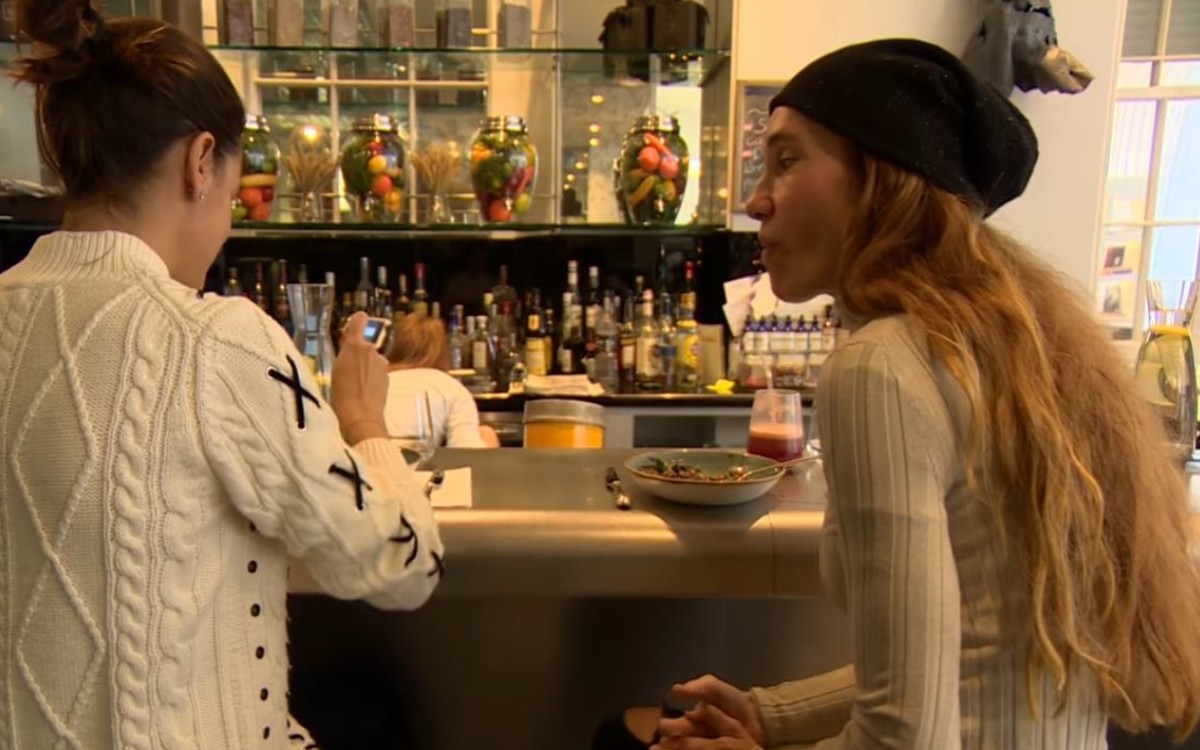
An anti-trans activist has announced plans to open a private, members-only lesbian bar that refuses admission to trans women in London later this year, although details on where the bar will be located or when it will open have yet to be revealed.
The bar, to be called L Community, will be a private, members-only bar, which owner Jenny Watson, 32, says will allow her to skirt discrimination laws by restricting membership to cisgender lesbians.
Watson has gain notoriety in England for throwing lesbian focused events that exclude trans women.
Last year, Watson threw a lesbian speed-dating event that gathered controversy for its trans-exclusion policy, but was ultimately allowed to go ahead.
Watson says the backlash to that event has led to her other trans-exclusionary events being refused or cancelled by venues she’s tried to book. Having her own venue will allow her to host her own events.
“No one will take bookings for my events any more,” Watson told the Telegraph. “The trans activists are constantly targeting the events, so venues don’t want anything to do with them.”
“We should have a right to our own space — hence the idea to set up the bar. It will be for biological females only and this is why we’re making it a members-only club so we can legally restrict it to women,” she said.
On the web site for L Community, Watson lists potential events the bar could host, including speed dating, networking events, lesbian movie nights, open mics, trivia nights, book clubs and panel discussions.
Even though the bar has no opening date, L Community is already soliciting free and premium memberships, which its website says will come with priority access to events and L Community’s “social media platform.” Premium members are asked to make a “donation” of £120 (approximately $150.)
Anyone wishing to join must attest to being a biological female and upload government ID to the L Community website as proof.
Trans journalist Shivani Dave criticized the “crap new terf [trans-exclusionary radical feminist] bar” on their Instagram account and announced a plan to hold a trans-inclusive kiss-in in front of the bar “if it ever opens.”
“YOU THINK I’M JOKING? We are gonna go and make out in front of this TERF bar every single day until it closes. Lol that is if it ever even opens. Bigots be bigoting? Trans+ people are gonna be snogging,” they wrote.
THAILAND
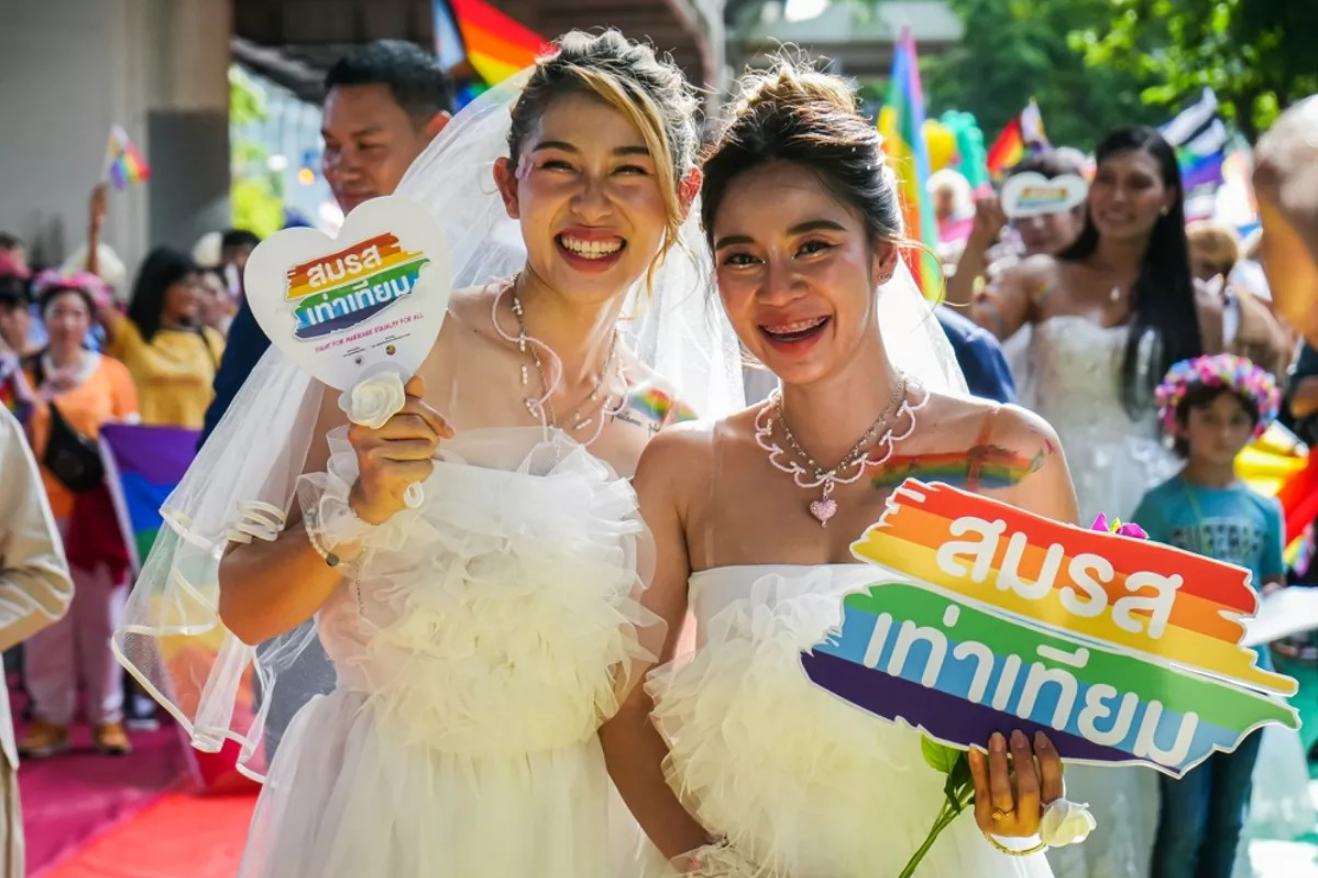
Thailand got one step closer to legalizing same-sex marriage this week as the Senate voted 147-3 to advance the marriage bill through first reading. The bill now heads to a committee which has up to 60 days to study the bill before returning it to the senate for second and third reading.
Advancing LGBTQ rights has become a major issue in the southeast Asian country of 66 million over the last decade. Last year saw the opposition Move Forward Party win a plurality of seats in elections to Parliament’s lower house after it promised to legalize same-sex marriage. But the party was barred from government by a court ruling its leader breached the constitution by proposed changes to the country’s strict laws that forbid criticism of the monarchy.
The governing coalition that was later formed without Move Forward agreed to make marriage equality and LGBTQ rights a part of the coalition agreement anyway, and last month the lower house gave final, overwhelming approval to the same-sex marriage bill.
There had been some worry that the bill would face a rougher ride through the more conservative senate, which is made up of appointees of the Thai military, a holdover from the last junta that ran the country until 2017.
But the overwhelming support for the bill in the senate signals that it will likely pass and be sent to the king for royal assent before the summer, with it coming into effect before the end of the year.
Thailand will likely become the first state in southeast Asia to legalize same-sex marriage. Elsewhere in Asia, only Taiwan has legalized same-sex marriage, while the Nepalese Supreme Court has legalized it, although it can be difficult for couples to marry in practice.
Thailand’s push to enhance LGBTQ rights hasn’t stopped at marriage. Prime Minister Srettha Thavisin has ordered his Cabinet to draft a bill to allow trans people to change their legal gender, and the government is also considering changes to surrogacy law to allow same-sex couples and foreigners to access services to have children. The government is also directing resources toward ending HIV transmission in the country by making PrEP more widely available.
The government is eager to promote Thailand as an LGBTQ tourist destination, and is bidding to have Bangkok host World Pride 2028.
JAPAN
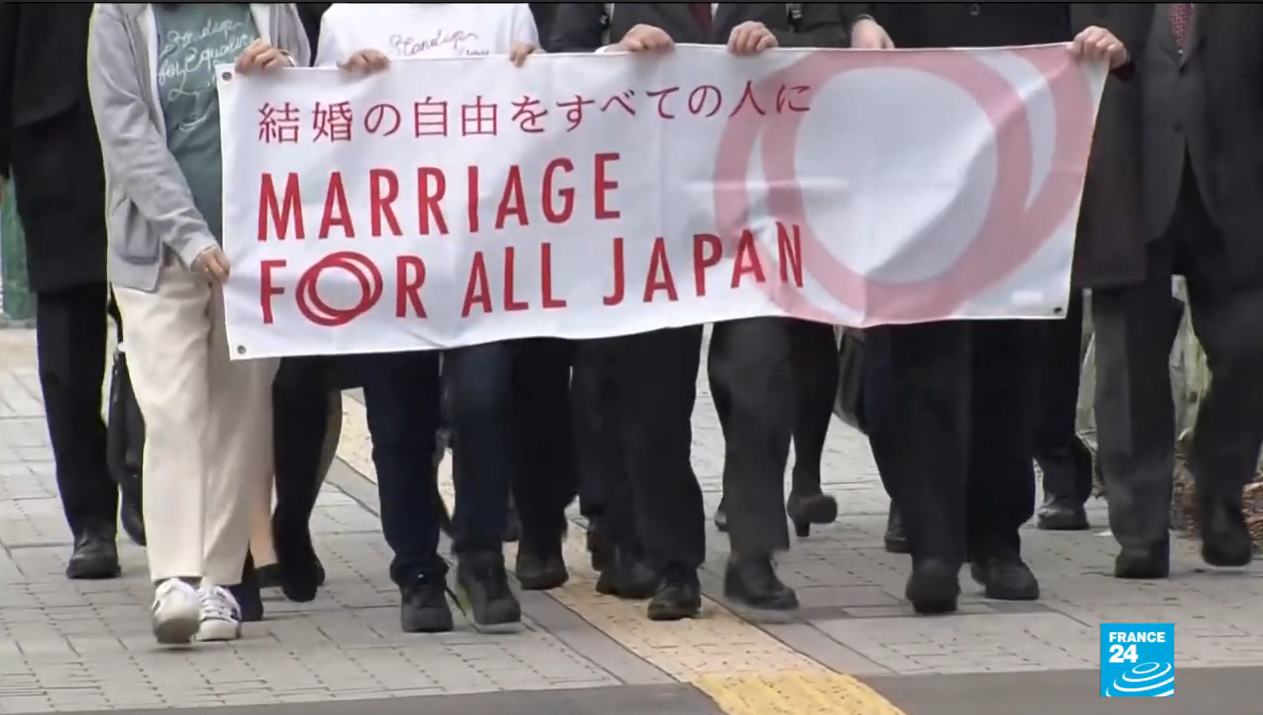
Five more prefectures and more than 40 municipalities began offering partnership certificates to same-sex couples on April 1, providing a limited measure of security for Japan’s LGBTQ couples as marriage remains out of reach.
While courts and the national government continue to fail to recognize same-sex marriage, local governments across the country are stepping up to fill the void with “partnership certificates” for same-sex couples. The certificates can help couples access local services reserved for couples and hospital visitation, but they are not considered legally binding. Couples do not access inheritance rights and are not treated as legal next of kin.
Beginning April 1, Aichi, Hyōgo, Nara, Ōita, and Tokushima prefectures began offering partnership certificates, bringing the total to 26 out of 47 prefectures recognizing same-sex couples. Additionally, 445 municipalities offer the certificates, according to Marriage for All Japan, a local advocacy group. More than two-thirds of Japanese people live in a jurisdiction that offers same-sex partnerships.
Some prefectures go further, offering “familyship” registries that allow same-sex couples to also register their children.
Same-sex marriage, however, remains out of reach for same-sex couples. National lawmakers have proven too conservative to advance LGBTQ rights.
Last year, a government bill that was meant to ban discrimination was given much fanfare ahead of the G7 conference in Tokyo. Conservative lawmakers pushed back and the bill was watered down to simply promote “understanding” of LGBTQ people, with no actual legal protections offered.
Meanwhile, a multi-year effort to advance same-sex marriage through the courts has delivered several key rulings finding that the ban on same-sex marriage is unconstitutional, but the courts have thus far failed to offer couples any remedy.
Last month, the first appellate-level court issued a ruling finding the marriage ban unconstitutional, but again did not order the government to allow same-sex marriage. The couples involved in the case have said they will appeal to the Supreme Court. Other marriage cases are still ongoing in other district and appellate courts.
For its part, the Supreme Court recently ruled that same-sex couples must be given access to a benefit paid to the survivors of crime victims on an equal basis as married heterosexual couples. Observers are already saying that the ruling will have implications for the full suite of benefits of marriage, including when it comes to taxes, housing, inheritance, pension and insurance.
PHILIPPINES
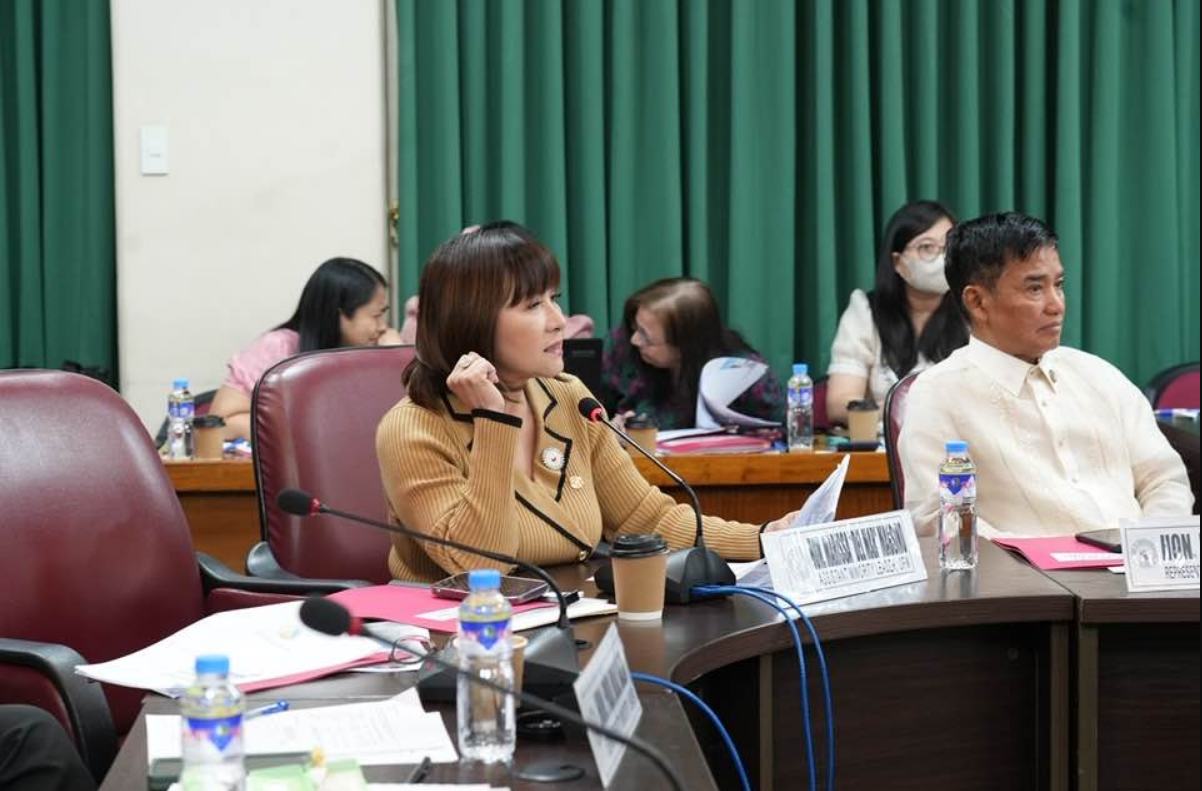
Filipino legislator Marissa Magsino of the opposition OFW Party has filed a bill in Congress seeking to recognize the property rights of same-sex couples, which would be a landmark of progress in the deeply Catholic Asian country if passed.
The bill was filed March 20 but has not yet been called for a first reading, it is a companion to a similar bill filed in the Senate in November 2022, which has been stuck in committee since.
Both bills would only offer limited property rights to same-sex couples. Couples would be deemed to share ownership and responsibility for any property acquired during the partnership, unless a written agreement is signed saying otherwise. A partnership would only be deemed to exist if partners cohabit for at least one year.
The bill aims to treat partners equitably in the event of a breakup.
While this is a very limited set of rights, the Philippines does not currently offer any recognition of same-sex couples or their property rights.
“Though through the years there has been change in the mindset of people on long-standing stereotypes and generalizations with social perceptions becoming more accommodating of the LGBTQ+ community, there’s still no legislation that guarantees equal rights for everybody regardless of sexual orientation or gender identity,” Magsino said in a statement to the Manila Bulletin on April 2.
“This legislation is a significant step towards achieving greater equality and justice for all Filipino citizens, regardless of their sexual orientation or gender identity. It is imperative that we ensure equal protection under the law for every individual in our society,” she said.
Proposals to create more expansive civil unions that recognize a broader set of rights similar to marriage for same-sex couples have occasionally been lodged in Congress, but none has ever been brought to a vote.
In 2019, the Supreme Court dismissed a petition seeking a right to same-sex marriage for lack of standing, as the petitioner did not seek to get married himself. The petitioner and his counsel were cited for indirect contempt of court over the matter.
The Philippines Congress has struggled to advance any pro-LGBTQ+ legislation for years. A bill that would add discrimination protections for sexual orientation, gender identity and gender expression, dubbed the SOGIE Bill, has been introduced multiple times since 2001, and has even passed the House of Representatives multiple times, but has always stalled in the more conservative Senate.
Dozens of provinces and municipalities have passed local non-discrimination ordinances across the country.
Africa
LGBTQ groups question US health agreements with African countries
Community could face further exclusion, government-sanctioned discrimination

Some queer rights organizations have expressed concern that health agreements between the U.S. and more than a dozen African countries will open the door to further exclusion and government-sanctioned discrimination.
The Trump-Vance administration since December has signed five-year agreements with Kenya, Uganda, and other nations that are worth a total of $1.6 billion.
Kenyan and Ugandan advocacy groups note the U.S. funding shift from NGO-led to a government-to-government model poses serious risks to LGBTQ people and other vulnerable populations in accessing healthcare due to existing discrimination based on sexual orientation.
Uganda Minority Shelters Consortium, Let’s Walk Uganda, the Kenya Human Rights Commission, and the Center for Minority Rights and Strategic Litigation note the agreements’ silence on vulnerable populations in accessing health care threatens their safety, privacy, and confidentiality.
“Many LGBTQ persons previously accessed HIV prevention and treatment, sexual and reproductive health services, mental health support, and psychosocial care through specialized clinics supported by NGOs and partners such as USAID (the U.S. Agency for International Development) or PEPFAR,” Let’s Walk Uganda Executive Director Edward Mutebi told Washington Blade.
He noted such specialized clinics, including the Let’s Walk Medical Center, are trusted facilities for providing stigma-free services by health workers who are sensitized to queer issues.
“Under this new model that sidelines NGOs and Drop-in Centers (DICs), there is a high-risk of these populations being forced into public health facilities where stigma, discrimination, and fear of exposure are prevalent to discourage our community members from seeking care altogether, leading to late testing and treatment,” Mutebi said. “For LGBTQ persons already living under criminalization and heightened surveillance, the loss of community-based service delivery is not just an access issue; it is a full-blown safety issue.”
Uganda Minority Shelters Consortium Coordinator John Grace said it is “deeply troubling” for the Trump-Vance administration to sideline NGOs, which he maintains have been “critical lifelines” for marginalized communities through their specialized clinics funded by donors like the Global Fund and USAID.
USAID officially shut down on July 1, 2025, after the White House dismantled it.
Grace notes the government-to-government funding framework will impact clinics that specifically serve the LGBTQ community, noting their patients will have to turn to public systems that remain inaccessible or hostile to them.
“UMSC is concerned that the Ugandan government, under this new arrangement, may lack both the political will and institutional safeguards to equitably serve these populations,” Grace said. “Without civil society participation, there is a real danger of invisibility and neglect.”
Grace also said the absence of accountability mechanisms or civil society oversight in the U.S. agreement, which Uganda signed on Dec. 10, would increase state-led discrimination in allocating health resources.
Center for Minority Rights and Strategic Litigation Legal Manager Michael Kioko notes the U.S. agreement with Kenya, signed on Dec. 4, will help sustain the country’s health sector, but it has a non-binding provision that allows Washington to withdraw or withhold the funding at any time without legal consequences. He said it could affect key health institutions’ long-term planning for specialized facilities for targeted populations whose independent operations are at stake from NGOS the new agreement sidelines.
“The agreement does not provide any assurance that so-called non-core services, such as PrEP, PEP, condoms, lubricants, targeted HIV testing, and STI prevention will be funded, especially given the Trump administration’s known opposition to funding these services for key populations,” Kioko said.
He adds the agreement’s exclusionary structure could further impact NGO-run clinics for key populations that have already closed or scaled down due to loss of the U.S. funding last year, thus reversing hard-won gains in HIV prevention and treatment.
“The socio-political implications are also dire,” Kioko said. “The agreement could be weaponized to incite discrimination and other LGBTQ-related health issues by anti-LGBTQ voices in the parliament who had called for the re-authorization of the U.S. funding (PEPFAR) funding in 2024, as a political mileage in the campaign trail.”
Even as the agreement fails to safeguard specialized facilities for key populations, the Kenya Human Rights Commission states continued access to healthcare services in public facilities will depend on the government’s commitment to maintain confidentiality, stigma-sensitive care, and targeted outreach mechanisms.
“The agreement requires compliance with applicable U.S. laws and foreign assistance policies, including restrictions such as the Helms Amendment on abortion funding,” the Kenya Human Rights Commission said in response to the Blade. “More broadly, funded activities must align with U.S. executive policy directives in force at the time. In the current U.S. context, where executive actions have narrowed gender recognition and reduced certain transgender protections, there is a foreseeable risk that funding priorities may shift.”
Just seven days after Kenya and the U.S. signed the agreement, the country’s High Court on Dec. 11 suspended its implementation after two petitioners challenged its legality on grounds that it was negotiated in secrecy, lacks proper parliamentary approval, and violates Kenyans’ data privacy when their medical information is shared with America.
The agreement the U.S. and Uganda signed has not been challenged.
European Union
European Parliament resolution backs ‘full recognition of trans women as women’
Non-binding document outlines UN Commission on the Status of Women priorities

The European Parliament on Feb. 11 adopted a transgender-inclusive resolution ahead of next month’s U.N. Commission on the Status of Women meeting.
The resolution, which details the European Union’s priorities ahead of the meeting, specifically calls for “the full recognition of trans women as women.”
“Their inclusion is essential for the effectiveness of any gender-equality and anti-violence policies; call for recognition of and equal access for trans women to protection and support services,” reads the resolution that Erin in the Morning details.
The resolution, which is non-binding, passed by a 340-141 vote margin. Sixty-eight MPs abstained.
The commission will meet in New York from March 10-21.
A sweeping executive order that President Donald Trump signed shortly after he took office for a second time on Jan. 20, 2025, said the federal government’s “official policy” is “there are only two genders, male and female.” The Trump-Vance administration has withdrawn the U.S. from the U.N. LGBTI Core Group, a group of U.N. member states that have pledged to support LGBTQ and intersex rights, and dozens of other U.N. entities.
India
Trans students not included in new India University Grants Commission equity rules
Supreme Court on Jan. 29 delayed implementation

The University Grants Commission is a regulatory body under India’s Education Ministry that is responsible for coordinating and maintaining standards in higher education. The University Grants Commission Equity Regulations, 2026, aim to address discrimination and promote the inclusion of lower castes, tribes, people with disabilities, those who are economically disadvantaged, and other marginalized groups in higher education.
The regulations quickly triggered controversy.
Students, faculty and civil society groups criticized them, largely around concerns about potential discrimination against students and the absence of certain procedural safeguards. Yet, even as the debate intensified, there was little public discussion about the lack of explicit mention of transgender students in the framework. The omission, though not central to the overall controversy, raised questions among some advocates about the scope of the regulations and who they ultimately protect.
According to the All India Survey on Higher Education, trans student enrollment in universities and colleges rose from 302 in the 2020-2021 academic year to 1,448 in the 2022-2023 academic year, reflecting a sharp increase but still representing a very small share of India’s overall higher education population.
The Supreme Court in its 2024 National Legal Services Authority v. Union of India affirmed trans people are entitled to full constitutional protection, including equality, dignity and access to education, and directed governments to treat them as a socially and educationally disadvantaged group eligible for quota-based protections in education and public employment. The ruling recognized gender identity as integral to personal autonomy and held that discrimination on this ground violates fundamental rights under Articles 14, 15, 16, and 21.
Against this legal backdrop, the regulations do not explicitly reference trans students, an omission that has drawn attention in discussions on how constitutional protections are implemented within higher education institutions.
In the Indian constitutional framework, Articles 14, 15, 16, and 21 collectively form the foundation of equality and personal liberty.
Article 14 guarantees equality before the law and equal protection of laws; Article 15 prohibits discrimination on grounds such as religion, race, caste, sex or place of birth; Article 16 ensures equality of opportunity in public employment; and Article 21 protects the right to life and personal liberty, which courts have interpreted to include dignity, autonomy, and access to education. These provisions underpin judicial recognition of protections for marginalized communities, including trans people, within public institutions.
Judicial and policy frameworks in India have increasingly recognized the need for institutional support for trans students, underscoring the contrast with the absence of explicit mention in the University Grants Commission Equity Regulations, 2026, regulations.
The Madras High Court has directed educational institutions to implement measures such as gender-neutral restrooms, mechanisms to update name and gender in official records, inclusion of trans identities in application forms and the appointment of LGBTQ-inclusive counselors for grievance redressal alongside enforcement of the Transgender Persons (Protection of Rights) Act and its Rules.
Policy instruments have echoed similar priorities.
The National Youth Policy 2014 acknowledged trans youth as a group facing social stigma and called for targeted interventions, while the National Education Policy 2020 emphasized reducing dropout rates and ensuring equitable access to education. The University Grants Commission itself has previously indicated that universities should adopt affirmative steps and institution-specific plans to support trans people, making their absence from the current regulatory text more pronounced.
Research and policy analyses have consistently documented structural barriers faced by trans students in India’s education system. The Center for Development Policy and Practices and other academic studies note that discrimination, bullying, and the absence of gender-sensitive infrastructure contribute to high dropout risks among trans students in both school and higher education. Census data underscore this disparity.
The 2011 Census recorded a literacy rate of about 56.1 percent among trans people, significantly lower than the national average of roughly 74 percent, reflecting long-standing barriers to access and retention in formal education.
The controversy intensified after the Supreme Court on Jan. 29 stayed the implementation of the University Grants Commission Equity Regulations, 2026, and agreed to examine their constitutional validity.
A bench led by Chief Justice Surya Kant observed the regulations raised serious legal questions, including concerns that some provisions appeared vague and potentially open to misuse, and sought responses from the federal government and the University Grants Commission. The court directed that the earlier 2012 anti-discrimination framework would remain in force in the interim and listed the matter for further hearing, signalling the need for detailed judicial scrutiny.
Public and political reactions followed, with student groups, academics, and political actors divided over the stay and the broader policy direction. The federal government, led by Prime Minister Narendra Modi, maintained the regulations were intended to address caste-based discrimination and strengthen accountability within higher education institutions even as debate intensified nationally.
The regulations go beyond paperwork. They require universities to create on-campus equity monitoring teams and designated officers responsible for identifying incidents of discrimination, receiving complaints and reporting them to institutional committees for action. However, while the framework spells out protections for certain caste and social categories, it does not explicitly include trans students within this structure. In practice, that absence could leave uncertainty about whether routine monitoring, reporting and grievance mechanisms would extend to them with the same clarity, particularly in campuses where implementation already varies widely.
The regulations also prescribe penalties for faculty and staff found responsible for discrimination, including suspension, withholding of promotions, or termination of service following institutional inquiry. For students, disciplinary action may range from warnings to suspension depending on the severity of the misconduct. Where an incident amounts to a violation of existing statutory or criminal law, institutions are required to refer the matter to law enforcement authorities, placing responsibility on universities to escalate cases beyond internal mechanisms when warranted.
The regulations do not create new criminal offences but require institutions to escalate cases to law enforcement when conduct violates existing statutes. These may include the Scheduled Castes and Scheduled Tribes (Prevention of Atrocities) Act, relevant provisions of the country’s penal code, such as criminal intimidation, assault or sexual harassment, disability rights protections, workplace harassment laws, and statutes addressing campus hazing. The framework is therefore stringent: campus inquiries can lead to disciplinary action, and, where legal thresholds are met, mandatory reporting to police. In the absence of explicit mention of trans students within the framework, questions remain about how individuals from the community would navigate complaint systems, interact with authorities, and access consistent institutional protections under these processes.
The Scheduled Castes and Scheduled Tribes (Prevention of Atrocities) Act, 1989 is among India’s strictest anti-discrimination criminal laws and applies to students, staff and any individual accused of caste-based offences. It criminalizes acts such as intentional insults or humiliation, social exclusion, threats, physical assault and other forms of harassment directed at members of specific castes or tribes. Offenses under the law can lead to arrest, non-bailable charges in several categories, and imprisonment that may extend from months to years depending on the severity of the conduct, along with fines. The law also restricts anticipatory bail in many cases and mandates prompt registration of complaints, which is why it is often viewed as a powerful legal safeguard for marginalized communities while also being regarded by some as carrying serious legal consequences once invoked.
Nishikant Dubey, a member of India’s ruling Bharatiya Jana Party, welcomed the Supreme Court’s decision to stay the regulations, stating the judges had acted appropriately and that the matter required careful legal scrutiny. Indrani Chakraborty, an LGBTQ rights activist and mother of a trans woman, told the Washington Blade the University Grants Commission Equity Regulations, 2026, is a welcome step toward supporting vulnerable students.
“The saddest part is that the transgender community is excluded which is very unfair,” said Chakraborty. “Presently, the transgender community is the most vulnerable and not mentioning the community in the act. I regard it as the biggest discrimination and will never help in changing the scenario of the transgender students.”
Chakraborty told the Blade the trans community, as a minority facing persistent social stigma and taboo, is often overlooked and must repeatedly advocate even for basic rights.
“I believe that grouping of individuals under caste, religion, gender, etc., is the base of discrimination. Personally, I disagree with naming and tagging any individual. Equity over equality is the need now for the most vulnerable. And the transgender community faces discrimination the most. Discrimination against any individual in educational institutions needs immediate attention and preventive measures should be necessarily implemented.”
Chakraborty said the absence of explicit inclusion of trans students amounts to discrimination, undermining equality in education and violating human dignity.
Ankit Bhupatani, a global diversity, equity and inclusion leader and LGBTQ activist, told the Blade that debate around the University Grants Commission Equity Regulations, 2026, has largely centered on concerns raised by relatively privileged students, particularly those in the unreserved category, while communities with limited visibility in higher education have received far less attention. Bhupatani also referenced the All India Survey on Higher Education statistics.
“According to Queerbeat, more than half of these 1,448 students are clustered in a few states and several large states still report almost no transgender students at all. Any serious equity regime has to guard every individual, including upper-caste students who are unfairly targeted or stereotyped , but the public conversation cannot pretend this tiny, highly vulnerable group does not exist,” said Bhupatani. “When outrage dominates headlines and the most marginalized are barely mentioned, the word ‘equity’ starts to lose meaning.”
Bhupatani told the Blade that the University Grants Commission Equity Regulations, 2026, define gender to include the “third gender” and prohibit discrimination on that basis, but then repeatedly identify lower castes, tribes, economically disadvantaged groups, people with disabilities, and women as specific groups, while trans students and teachers are not explicitly listed. Bhupatani said that for a young trans person reading the regulations, the message can feel indirect — that others are clearly recognized while their protections depend on interpretation. He added that explicitly naming trans people as a protected group would not dilute safeguards for others, but would instead ensure those already facing stigma are not left to seek recognition case by case.
“Transgender people sit at the intersection of legal vulnerability and social prejudice, so if they are not named and centered in large regulatory exercises, they quickly disappear from view,” said Bhupatani. “Campus rules need to start with a simple moral intuition. No one, whether Dalit or Brahmin, trans or cis, rich or poor, should be harassed, excluded or denied opportunity because of who they are. The University Grants Commission (Promotion of Equity in Higher Education Institutions) Regulations, 2026 already move in this direction by defining discrimination broadly for all students and staff and by listing grounds such as caste, gender, religion, disability, and place of birth. That universal shift is essential.”
Bhupatani said a fair equity framework should operate on two levels. First, it must guarantee that any individual, regardless of background, can seek redress if treated unfairly. Second, it should explicitly identify groups that face entrenched barriers — including lower castes and tribes, people with disabilities, and trans people — and build specific safeguards for them. He added that concerns about misuse could be addressed through clearer definitions, transparent procedures, trained inquiry committees, representation from diverse groups, and meaningful penalties for false or malicious complaints.
Kalki Subramaniam, a trans activist and artist, told the Blade that trans students face layered vulnerabilities — including social stigma, harassment, and systemic neglect — that often go unaddressed on campuses. When policies do not explicitly name them, she said, it signals that their struggles are not seen as warranting recognition, reinforcing isolation, and undermining their ability to access safe and dignified education.
“I have faced this and I really do not want this generation of transgender students to go through the same kind of exclusion and treatment,” said Subramaniam. “If the government truly believes in inclusive education, transgender students must be explicitly recognised in every policy conversation. Otherwise, we remain erased from the very spaces that claim to be suitable. We will certainly urge the government to ease and prioritise education for transgender community students.”
Subramaniam said limiting protections primarily to caste categories reflects a narrow approach to justice, noting that discrimination on campuses can also be shaped by gender, class, disability, and sexuality. She said a more expansive framework would protect any student facing discrimination, regardless of identity, and emphasized that equity must operate universally for campuses to function as spaces of learning rather than exclusion.
-

 Theater5 days ago
Theater5 days agoMagic is happening for Round House’s out stage manager
-

 Baltimore3 days ago
Baltimore3 days ago‘Heated Rivalry’ fandom exposes LGBTQ divide in Baltimore
-

 Real Estate3 days ago
Real Estate3 days agoHome is where the heart is
-

 District of Columbia3 days ago
District of Columbia3 days agoDeon Jones speaks about D.C. Department of Corrections bias lawsuit settlement




















